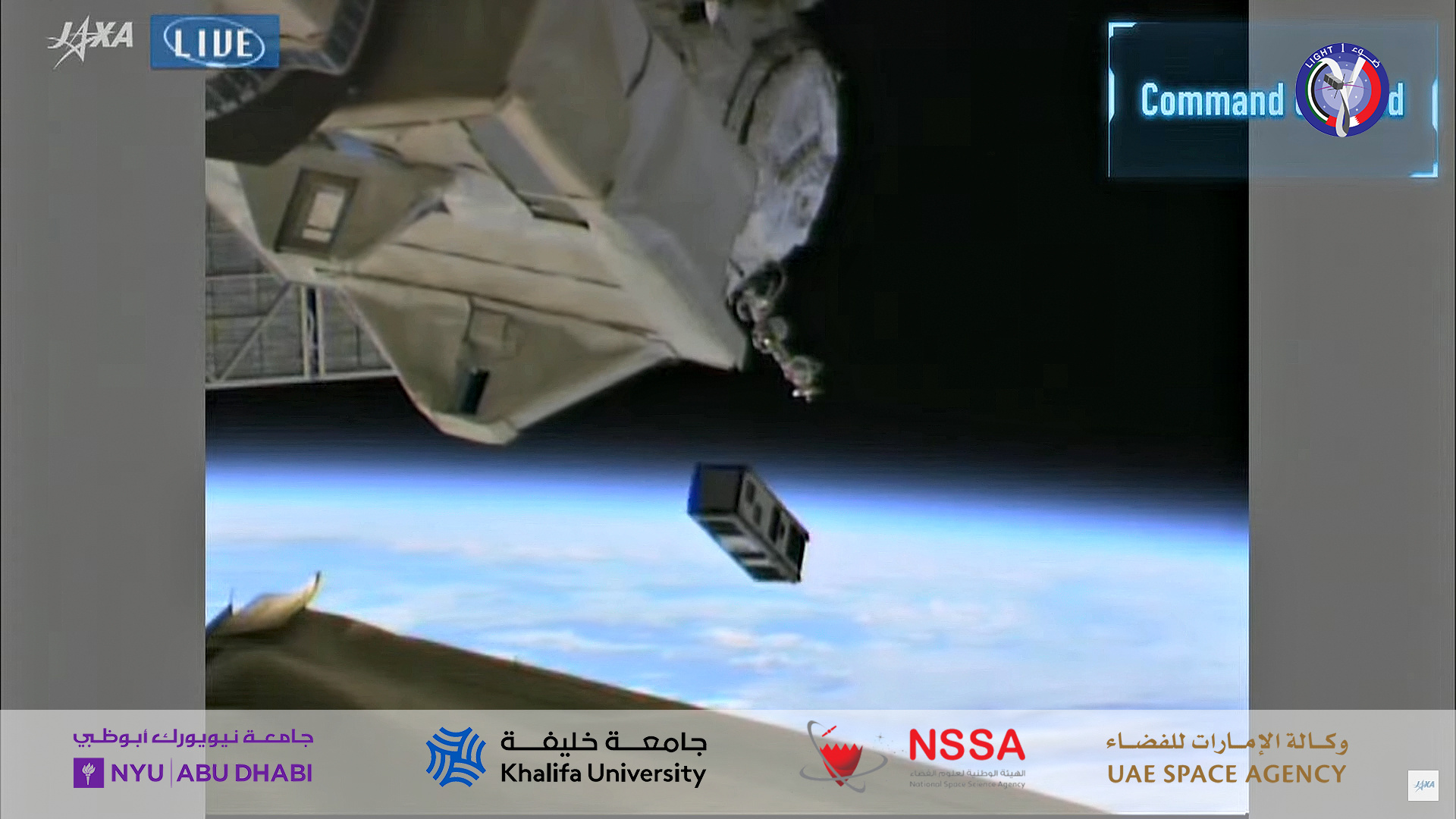
CubeSat Project Executed at Khalifa University and NYU Abu Dhabi with a Mission Team of 32 Students The Light-1 CubeSat, a collaboration initiative of the UAE Space Agency, Bahrain’s National Space Science Agency, Khalifa University of Science and Technology, and New York University (NYU) Abu Dhabi, was successfully launched into orbit from the International Space Station, in cooperation with the Japan Aerospace Exploration Agency (JAXA). JAXA coordinated the launch from the Tsukuba Space Center (TKSC) in Japan, and the event was broadcast live on social media channels. It was also live-streamed on Bahrain’s NSSA National TV and…
Read more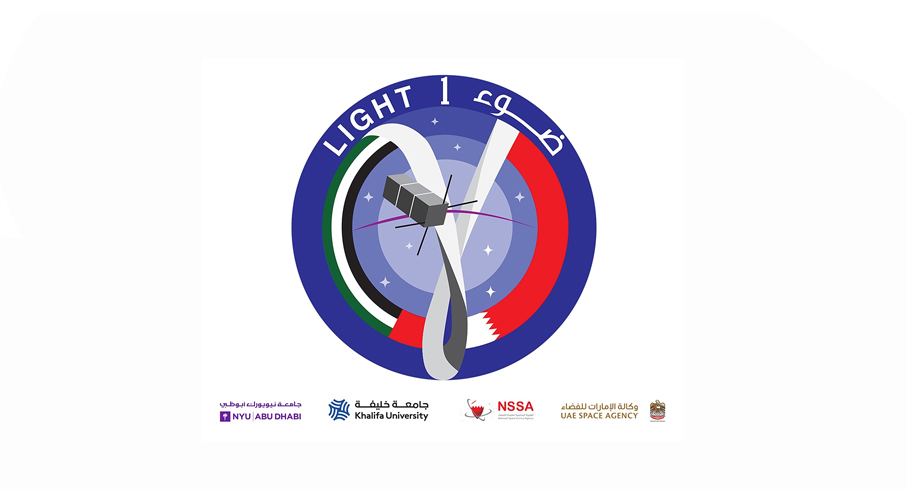
The joint UAE-Bahraini nanosatellite Light-1 was successfully deployed into its orbit from the International Space Station on 3 February 2022. 1st Deployment: Thursday, 3 February 2022 from 12:35-13:07 (GST) 2nd Deployment: Thursday, 3 February 2022 from 14:15-14:37 (GST) To read more about the Light-1 CubeSat, please click here.
Read more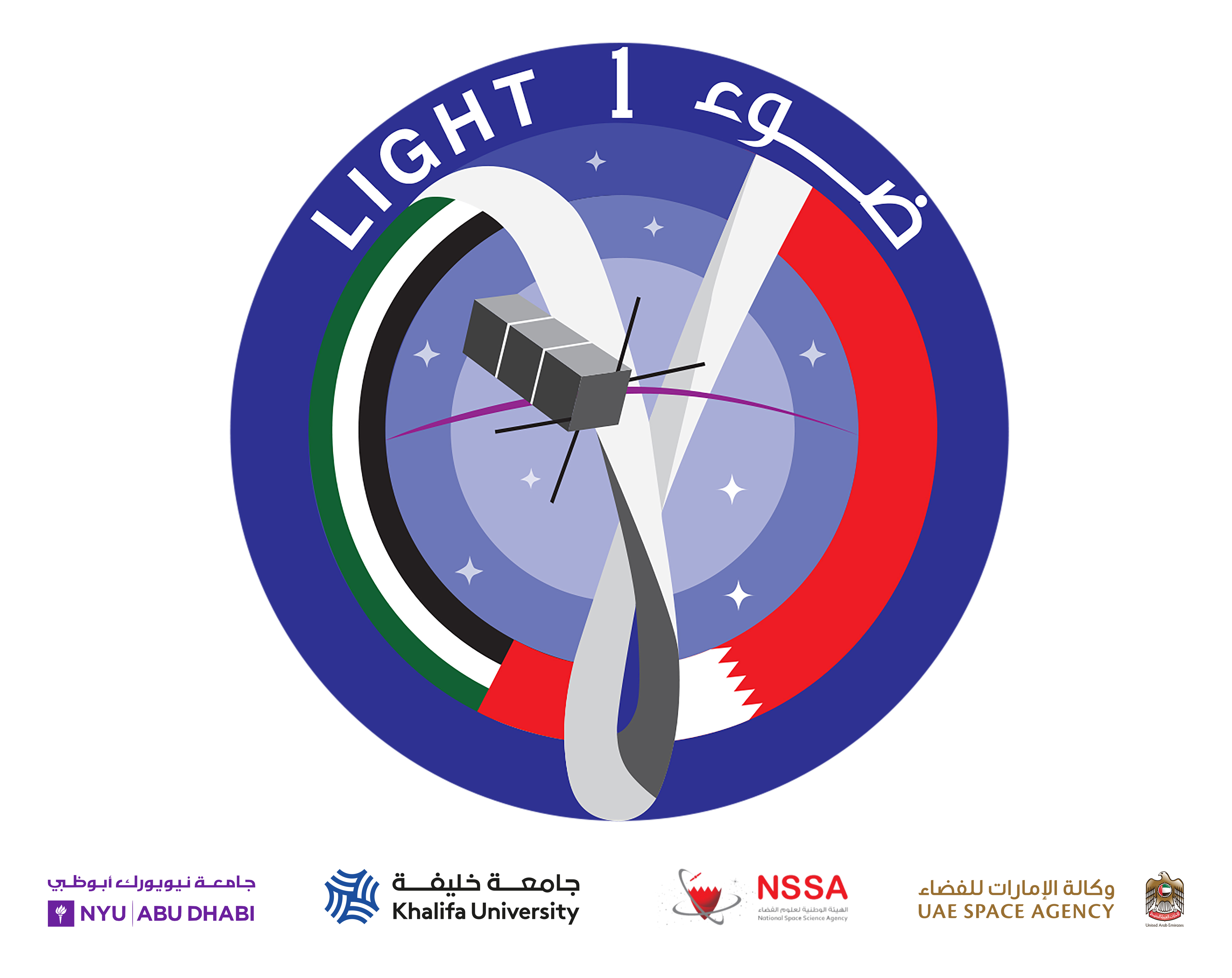
The team is made up of 22 students from Khalifa University, 10 Emiratis and 9 Bahrainis and 3 International students. The joint UAE-Bahraini nanosatellite Light-1 will be launched to the International Space Station on 21st December 2021. It represents a major milestone of cooperation in space science, technology and engineering between the UAE and Bahrain. Light-1 will take off onboard a SpaceX CRS-24 flight on board of a Falcon 9 rocket after undergoing rigorous safety and environmental tests for thermal and vibration, communication systems and more. Light-1 then will get deployed from the Japanese Experiment Module (KIBO) in…
Read more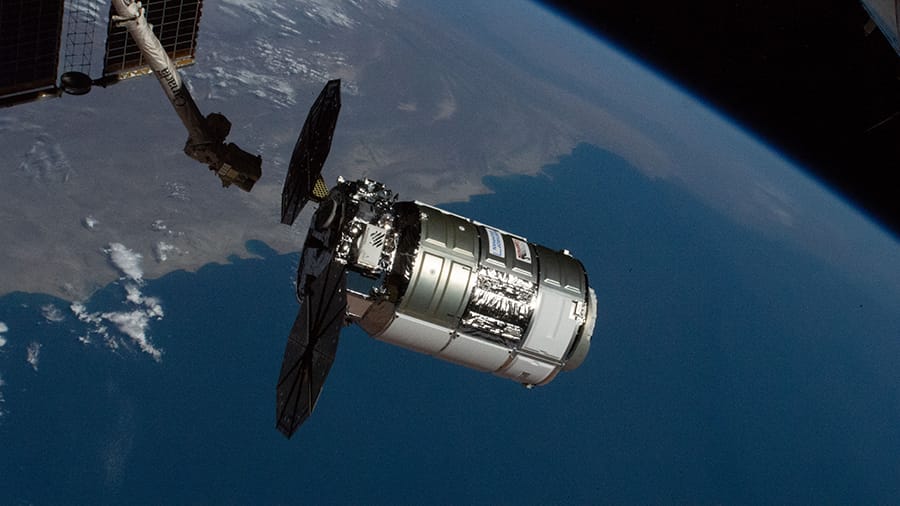
Second CubeSat Designed and Built by Students, Gently Eases into its Orbit after Leaving International Space Station Khalifa University and Al Yah Satellite Communications Company (Yahsat) have jointly announced the deployment of DhabiSat into orbit from Northrop Grumman’s Cygnus resupply spacecraft, marking yet another milestone achievement for the university and the UAE. DhabiSat, the second CubeSat designed and built by Khalifa University students, gently eased into its orbit after leaving the International Space Station (ISS). The primary mission of DhabiSat is to enable students to design, implement, and test software modules for attitude determination and control subsystems…
Read more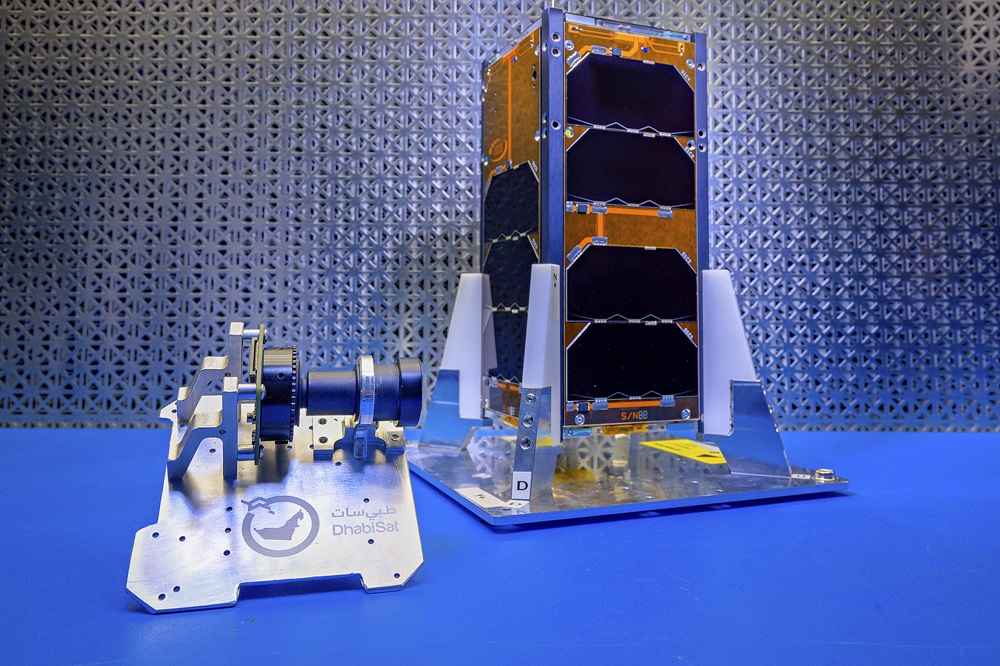
Meet the students, faculty and researchers who are contributing to the DhabiSat mission. DhabiSat is the second mini satellite, or CubeSat, to be developed by a team of KU students. Find out who they are and what role they are playing to ensure DhabiSat's success. To learn more about the mission and scope of DhabiSat, read this article. Faculty Dr. Firas Salah Jarrar Acting Manager of Yahsat Space Lab & Assistant Professor of Mechanical Engineering Students Ahmed Ali Albuainain MSc Engineering Systems and Management (Space Systems and Technology Concentration) / Member of Communication subsystem team. Also…
Read more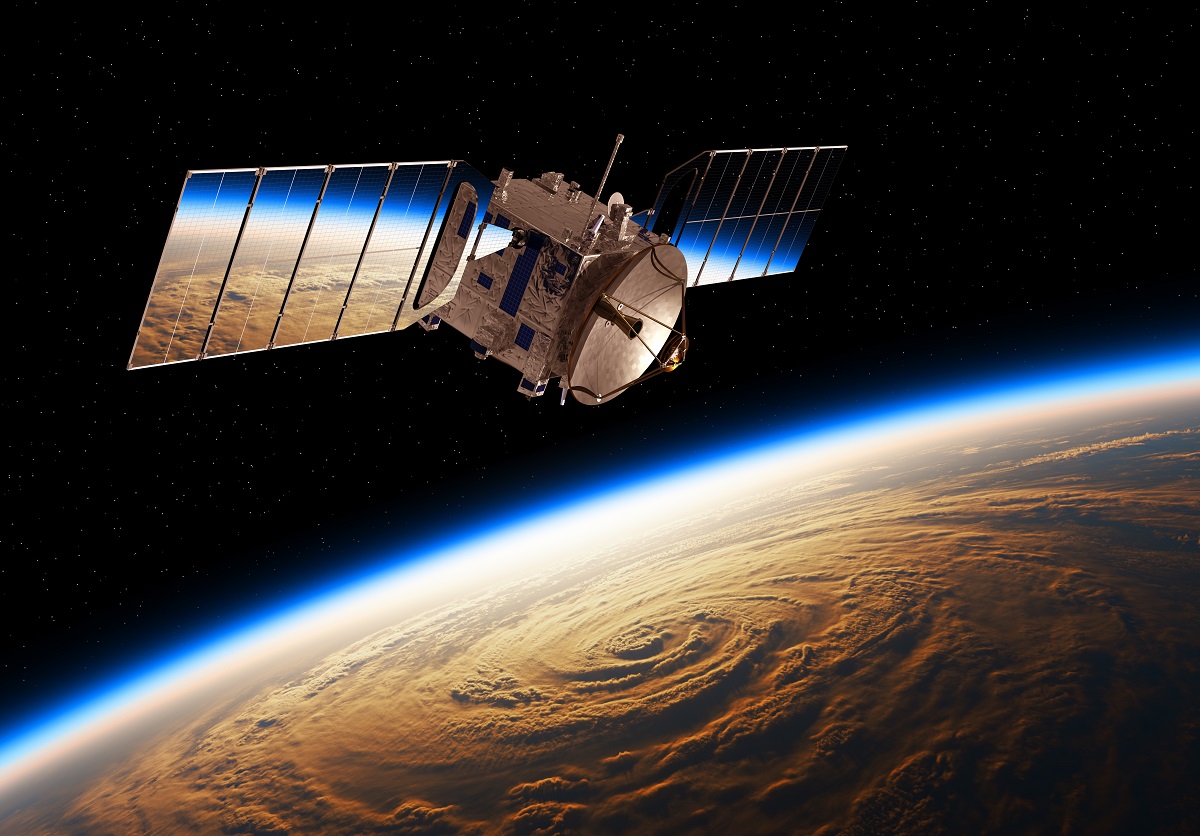
By Dr. Sean Swei The UAE and Italian scientific communities have both experienced unprecedented success in space exploration and earth observation in recent years, systematically promoting space technology through incremental research and development and radical innovation. The second in a series of webinars aiming to strengthen the opportunities for bilateral cooperation between Italy and the United Arab Emirates saw speakers discuss novel ideas and collaboration topics in technology development to support international space missions in different domains. Khalifa University recently launched the KU Space Technology and Innovation Lab (KUSTIL), in June 2020, of which I am the Director.…
Read more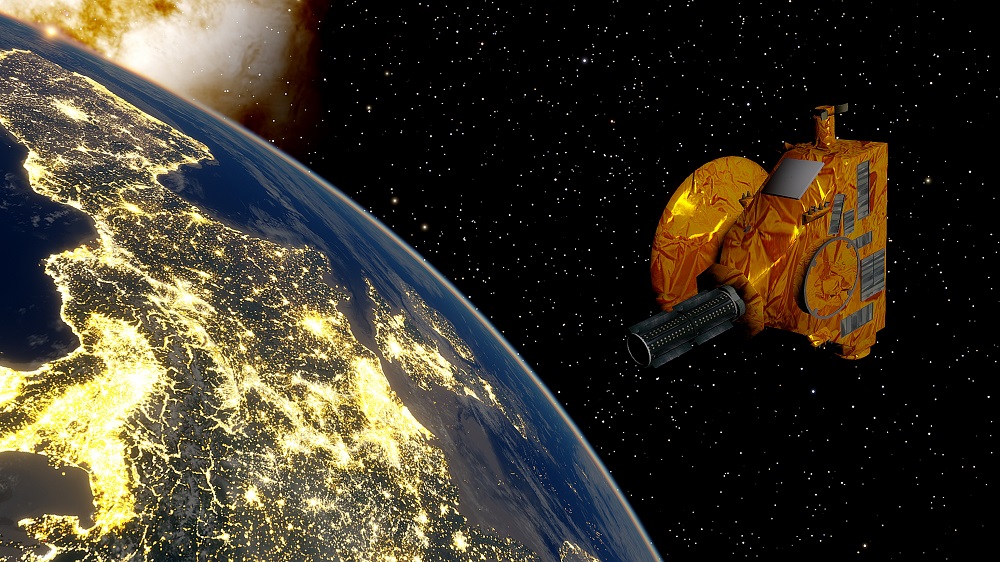
Read Arabic story here: http://researchku.com/news-extended/52 Greenhouse gas emissions from oil and gas operations pose a critical challenge for the industry, especially methane. Methane is responsible for 25 percent of global warming, with over a third of its emissions from the oil and gas industry. Detecting methane emissions and leaks has historically been difficult due to technical, logistical, and cost limitations. However, methane emission-tracking satellites offer an opportunity to achieve precise, timely, and affordable detection of methane on a large scale, particularly if machine learning models can be applied to the remote sensing data they capture. In the…
Read more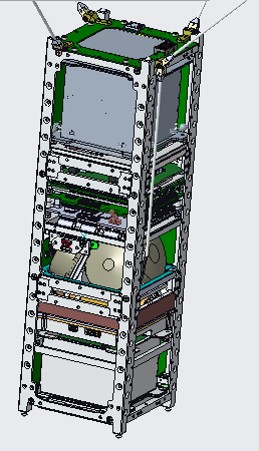
A 3U CubeSat for studying Terrestrial Gamma Ray Flashes Technology Demonstration of the High-Speed Gamma Ray Detectors developed by NYUAD Collaboration with NSSA (Bahrain), whose engineers are participating in the bus development as students at KU Expected to launch in August 2021
Read more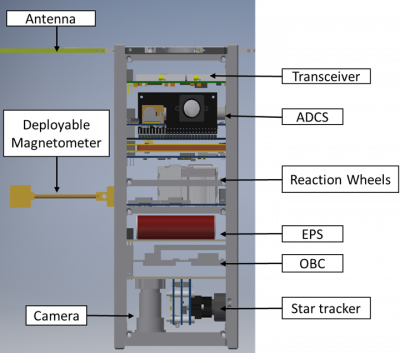
Mission Objectives: Develop software modules for attitude determination and control systems (ADCS). Testing pointing accuracy of different ADCS control strategies and validating them by taking a picture with a digital camera in the pointing direction. Expected to launch in March 2021 (NG-15)
Read more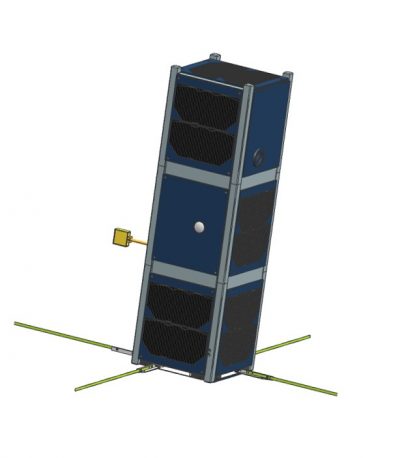
MeznSat is a 3U CubeSat satellite initiated and funded by the UAE Space Agency and in partnership with Masdar Institute/KU and the American University of Ras Al Khaimah (AURAK). MeznSat is an educational/scientific satellite aimed to enhance space research and education in the UAE and provide the UAE space industry with qualified well-trained graduates through hands-on experience. In addition, MeznSat scientific outcome will include monitoring the Green-House Gas (GHG) concentrations above UAE. Successfully launched on September 28, 2020 (Soyuz) See press release here: https://www.ku.ac.ae/khalifa-universitys-meznsat-successfully-launches-into-space
Read more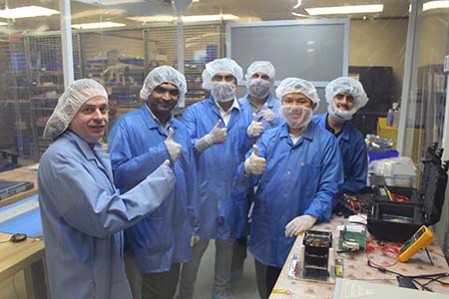
First CubeSat mission, intended primarily as an educational satellite It carried an experimental coin cell battery based on technology developed at Masdar Institute/KU along with a VGA camera developed at the lab based on COTS components Launched in November 2018 (NG-10), deployed in February 2019 (CYGNUS External Launch). Currently operational
Read more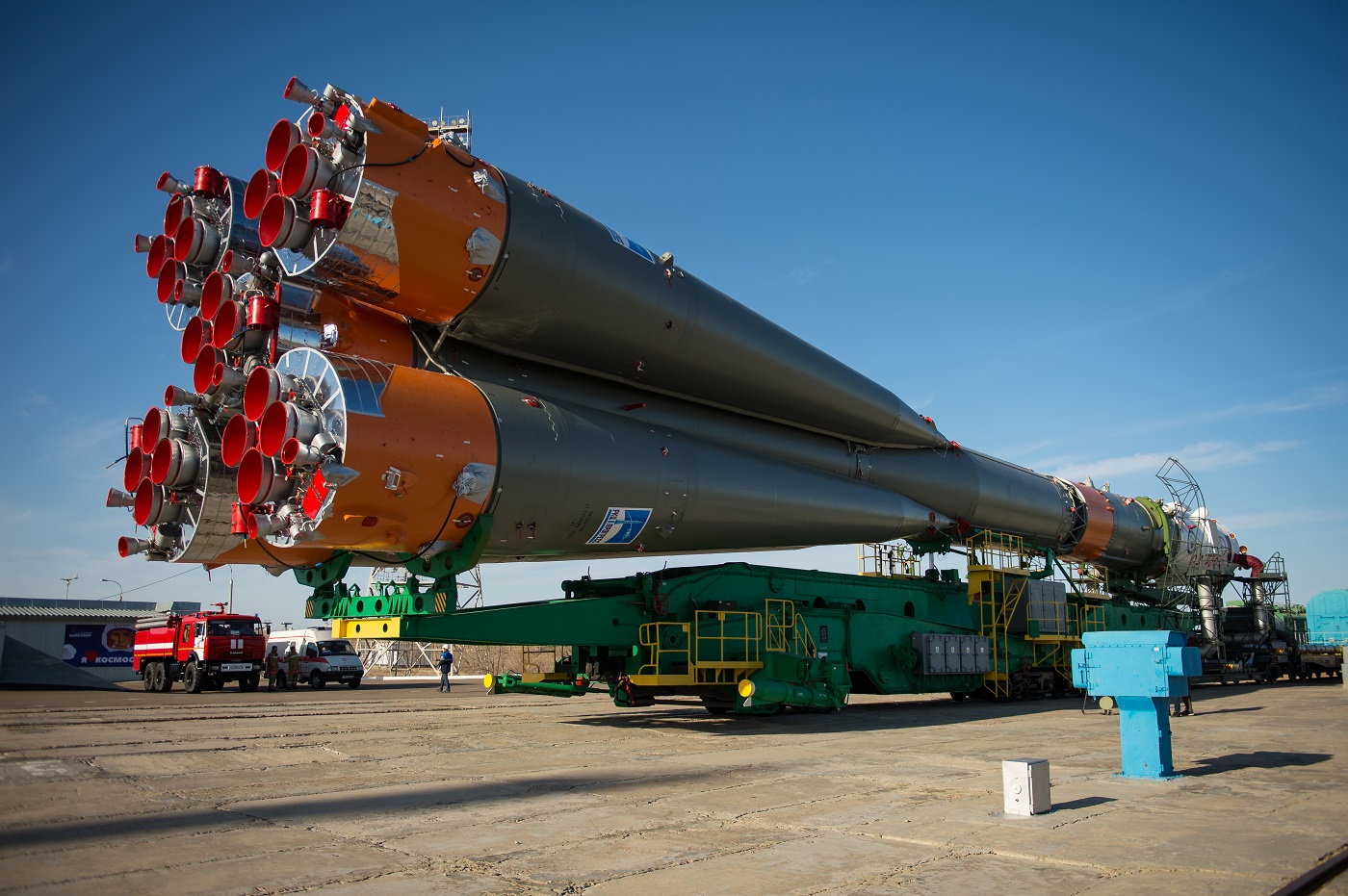
The mini CubeSat was developed by students from Khalifa University and the American University of Ras Al Khaimah, with support from UAE Space Agency The MeznSat, a mini satellite developed through a collaboration between Khalifa University, the American University of Ras Al Khaimah (AURAK), and the UAE Space Agency, has been successfully launched into space aboard a Soyuz-2b rocket from the Plesetsk Cosmodrome in Russia. https://www.instagram.com/p/CFrcz5Cp0ij/?utm_source=ig_web_button_share_sheet MeznSat is a nanosatellite that weighs around 2.7kg, and measures 10cm x 10cm x 30cm, making it a 3U CubeSat. A team of KU postgraduate students and AURAK undergraduate students developed the CubeSat.…
Read more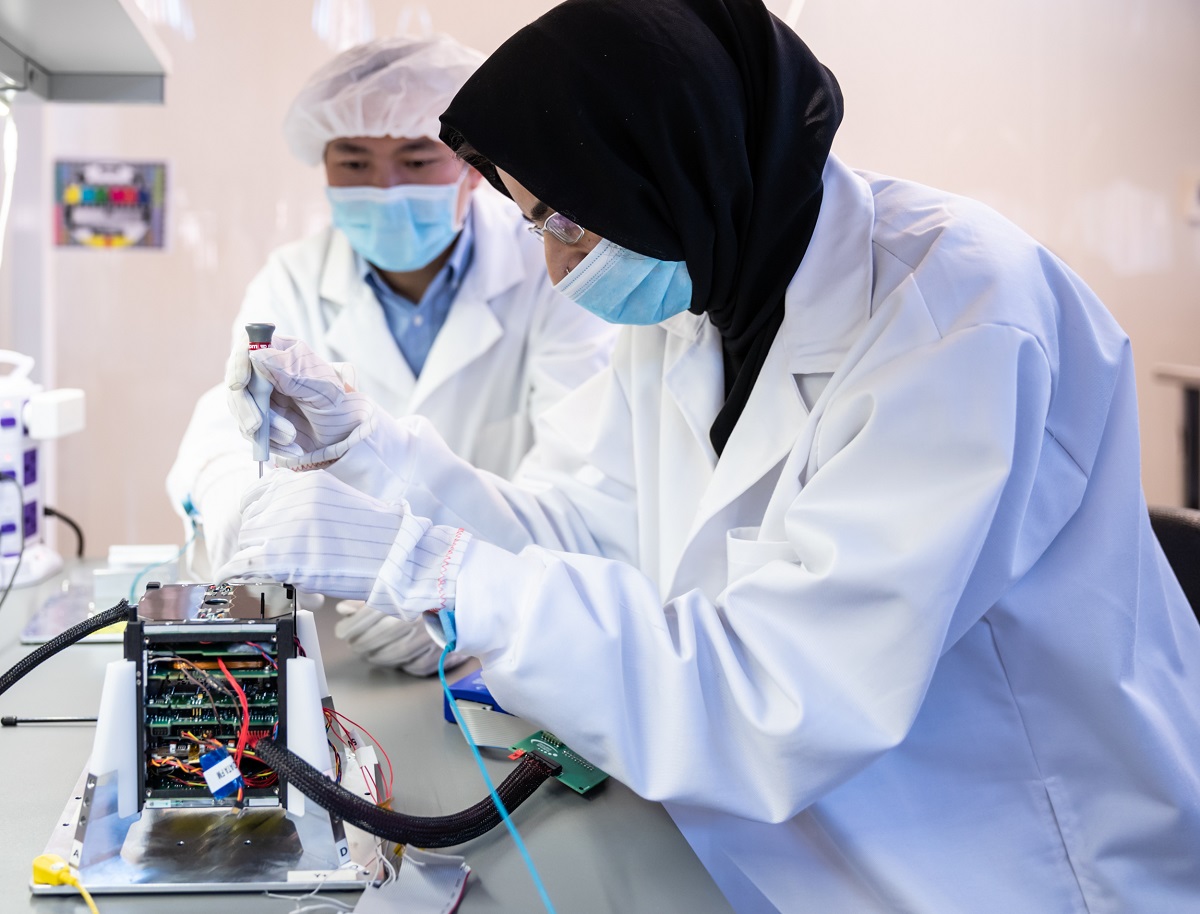
KUSTIL Will Incorporate Existing YahSat Space Lab and Focus on Training Students in Satellite Design and Manufacturing Khalifa University of Science and Technology, the UAE Space Agency (UAESA), and Al Yah Satellite Communications (YahSat), have signed a three-way funding agreement to establish and operate the Khalifa University Space Technology and Innovation Lab (KUSTIL), firmly committing to scientific innovations and laying the foundations for further inspiring the UAE’s future space missions. A virtual gathering in Abu Dhabi on the agreement was attended by His Excellency Dr. Ahmed Belhoul Al Falasi, Minister of State for Entrepreneurship and SMEs - Chairman of UAE…
Read more
Today, Sunday 21 June 2020, an annular solar eclipse was visible in the UAE, and a partial solar eclipse in Abu Dhabi. An expert at KU, Dr. Elena Fantino, Assistant Professor of Aerospace Engineering, explains what a solar eclipse is and its historical significance. A solar eclipse occurs when a portion of the Earth is covered by the shadow of the Moon which fully or partially blocks the light from the Sun. This happens when the Sun, Moon and Earth are aligned and the Moon passes between Earth and the Sun. An eclipse can be total or partial. In a total solar eclipse, the disk of the Sun is fully obscured…
Read more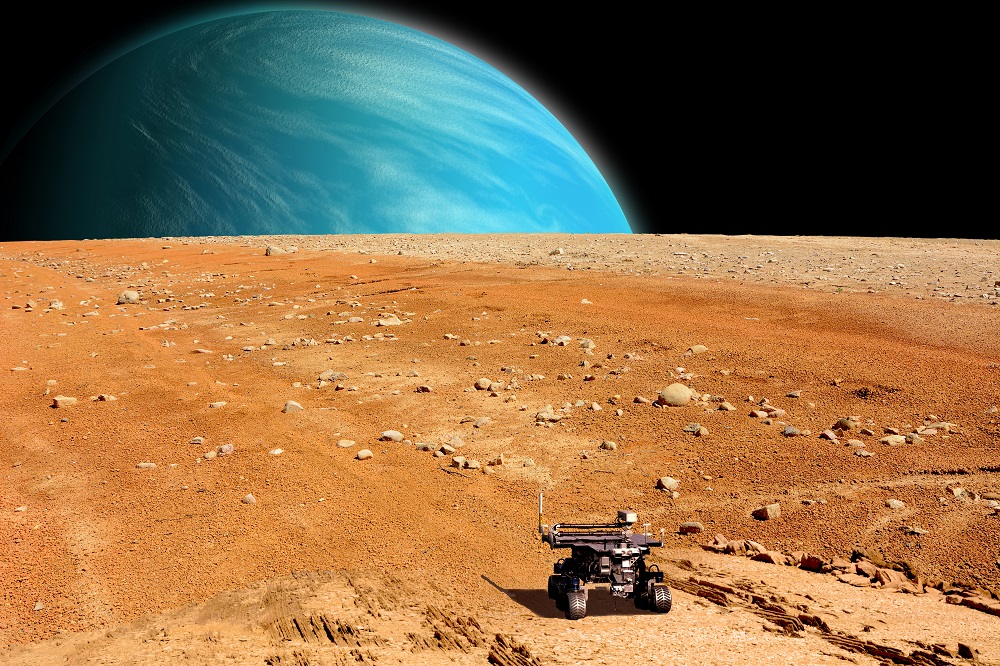
To help vehicles navigate their way around the solar system, Dr. Daniel Choi is leading a team to develop a novel micro-electromechanical system gyroscope and magnetometer for a miniaturized space attitude control system Rough terrain is tricky for anybody to navigate let alone an autonomous vehicle. A human walking across a rough terrain can instinctively adjust movements to stay upright; robots lack this instinctive balance. More than simply staying upright, an unmanned vehicle on a far-flung planet would need to keep its antenna accurately pointed towards Earth for communications; keep its data-collecting instruments precisely pointed for accurate onboard experiments and…
Read more
In the 1600s, Johannes Kepler proposed an elegant model for planetary motions—all planets move in elliptical orbits. Each orbit is the result of the gravitational attraction exerted by another body on an object in motion. “If you drop an object from a certain height, it will fall towards the center of the earth starting from zero velocity, and it will acquire speed as a result of the gravitational acceleration,” explained Dr. Elena Fantino, Assistant Professor of Aerospace Engineering at Khalifa University. “If you give that same object enough velocity in a ‘forwards direction’ instead, it will fly in a circular…
Read more
Khalifa University Researchers Advance Algorithms to Quickly and Accurately Calculate the Minimal Orbital Intersection Distance of Near-Earth Objects Far from merely a subgenre of science and disaster fiction, how to detect large asteroids that may collide with Earth is a real field of study and concern. A sufficiently large impact by an asteroid could cause massive tsunamis, multiple firestorms and an impact winter from dust and other debris in the stratosphere blocking sunlight, such as the collision 66 million years ago thought to have caused the Cretaceous-Paleogene extinction event, widely held responsible for the extinction of most dinosaurs. According to…
Read more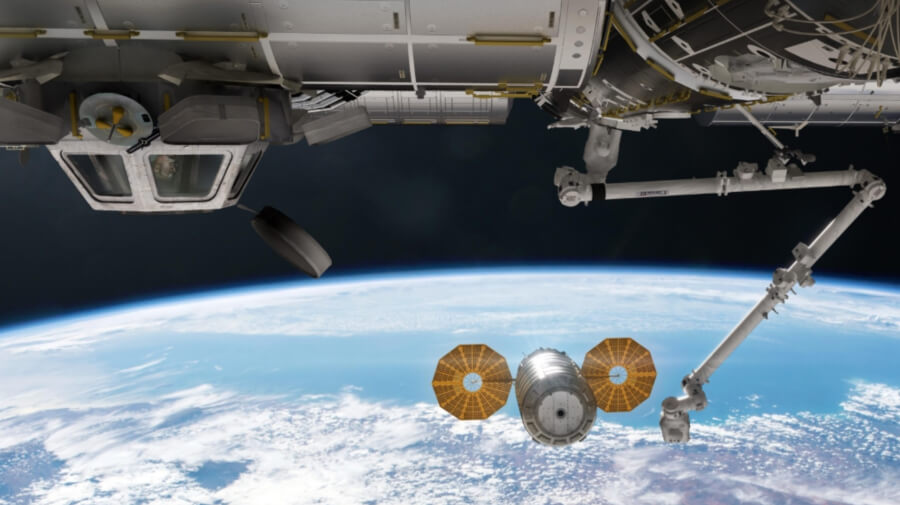
Student Developed Nanosatellite UAE’s First-Ever Earth Observation and Technology Demonstration CubeSat The MYSAT-1 CubeSat, designed and built by students of Khalifa University’s Master’s concentration in Space Systems and Technology in collaboration Al Yah Satellite Communications Company (Yahsat), and American aerospace manufacturer and defense industry company Northrop Grumman, has been successfully launched to the International Space Station (ISS) on board the Cygnus spacecraft. The satellite was onboard an Antares rocket that was successfully launched from Wallops Flight Facility in Virginia, USA, at 4:01am on Saturday, 17 November. Present at the launch were a group of Khalifa University students and faculty who…
Read more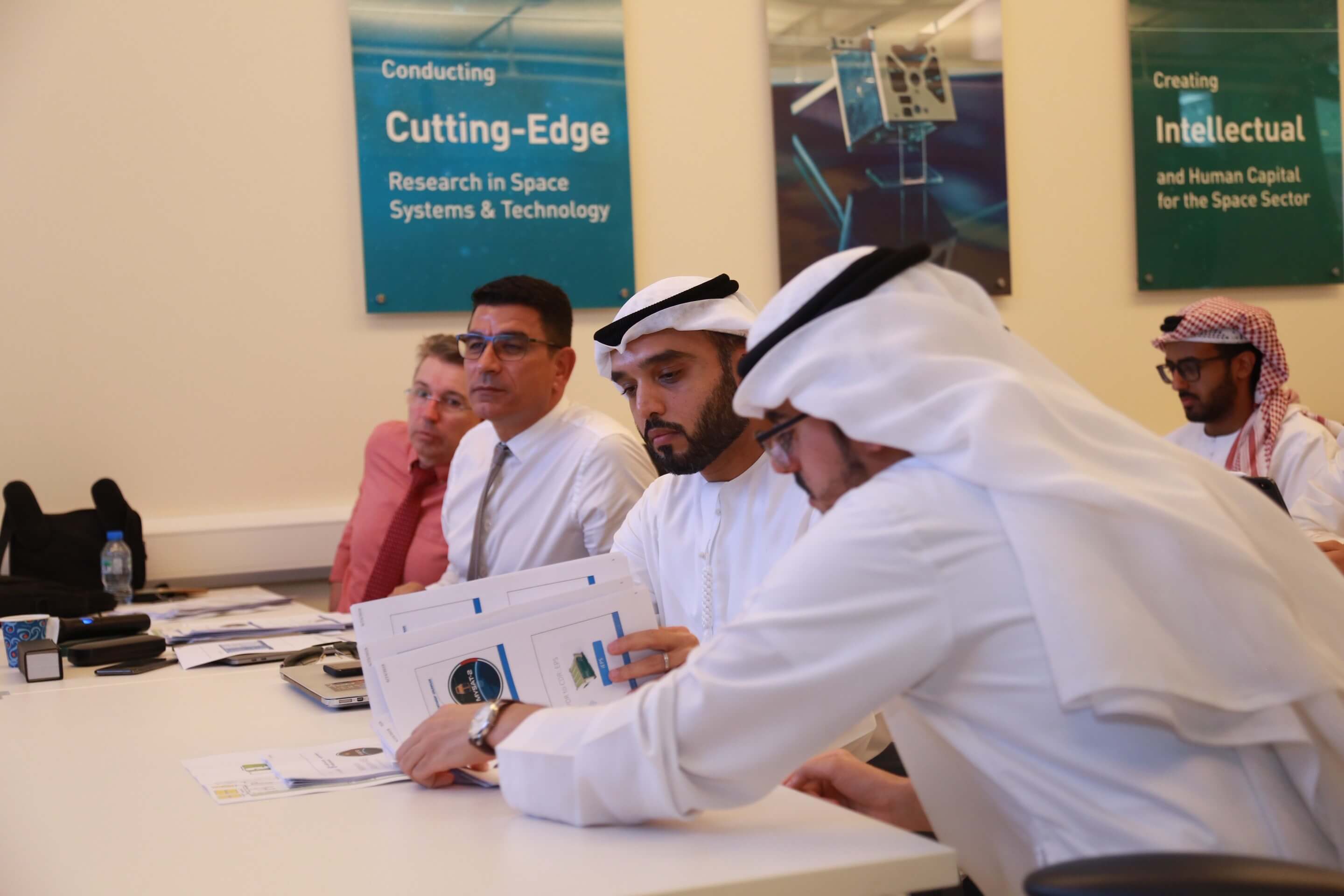
Once launched, MYSAT-2 will test student developed algorithms to determine the CubeSat’s orientation in space, estimated to be 15% to 20% more power-efficient Khalifa University is a step closer to launching its second satellite, MYSAT-2, into space after meeting an important milestone – the Critical Design Review (CDR) on Sunday, 23 June 2019, which wraps up the satellite’s design phase and marks the start of full-scale production in preparation for launch in Q2 2020. MYSAT-2 is the University’s second research satellite built by faculty and students in KU’s Space Systems and Technology program. Designed as a CubeSat, or a small satellite…
Read more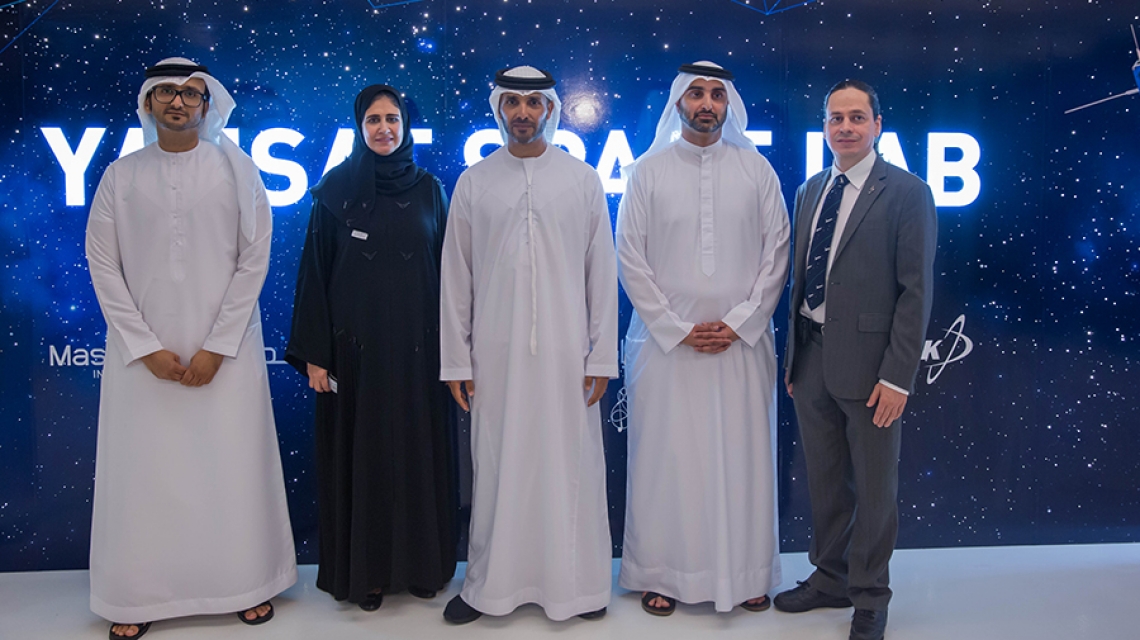
The Yahsat Space Laboratory, which aims to develop and advance technologies within the space sector and to make continuing strides toward the UAE’s advanced space ambitions, was launched by officials from Masdar Institute, Al Yahsat Satellite Communications Company (Yahsat), and Orbital ATK today at Masdar Institute. The new lab has been designed to provide students and faculty of the Masdar Institute Master’s concentration in space systems and technology with the facilities required to construct, test and launch miniature satellite CubeSats. The high-tech and specialized research facilities within the lab will also support the development of intellectual capital required to advance…
Read more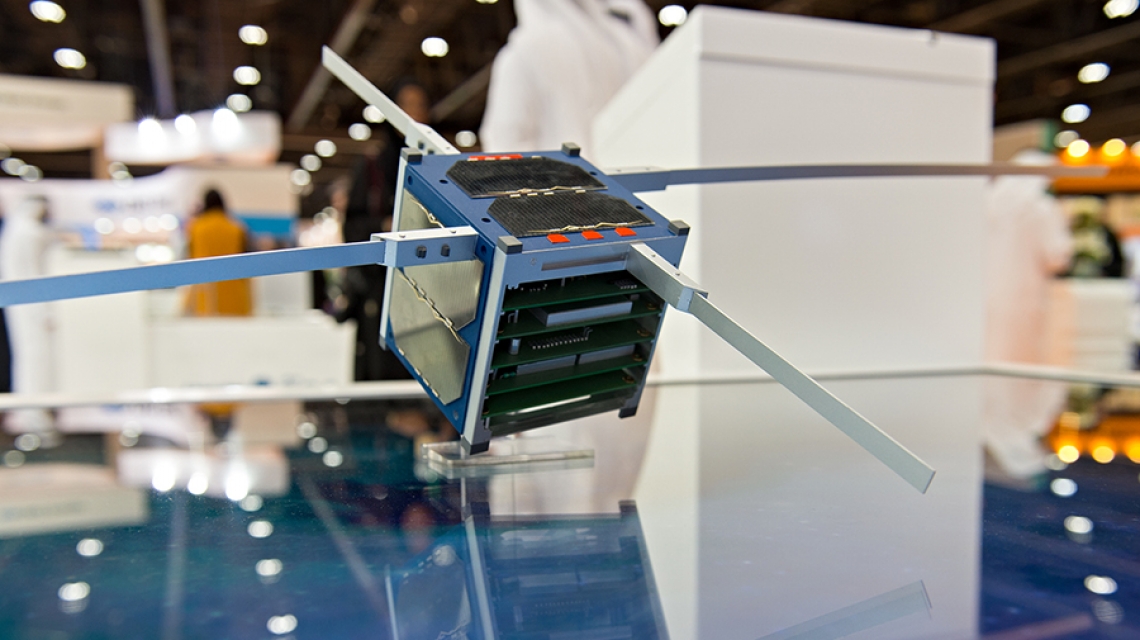
Masdar Institute has announced that its CubeSat development program has completed the preliminary design review (PDR), marking a critical milestone for the Institute’s Space Systems and Technology program, which was designed by Masdar Institute faculty with support from Al Yah Satellite Communications Company (Yahsat) and global aerospace manufacturer and defense industry leader Orbital ATK. Masdar Institute’s first CubeSat program now has only one more phase to clear before full-scale fabrication of the CubeSat can begin. This final stage, the critical design review (CDR), is scheduled for June 2017. The development of the Masdar Institute CubeSat program, called MYSAT-1, commenced with…
Read more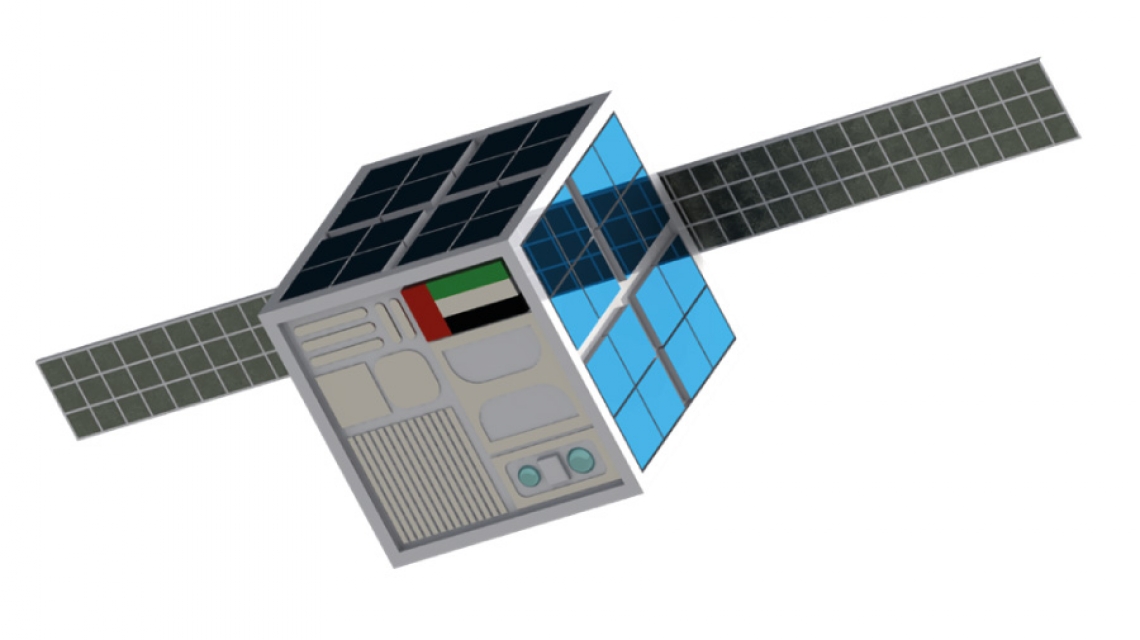
Abu Dhabi-UAE: 19 August, 2015 – The Masdar Institute of Science and Technology, an independent, research-driven graduate-level university focused on advanced energy and sustainable technologies, together with Yahsat, the UAE satellite operator, today announced that approval has been received from the Commission for Academic Accreditation (CAA) of the UAE Ministry of Higher Education and Scientific Research to incorporate a Space Systems and Technology concentration into seven of its Master of Science degree programs. The approval enables Masdar Institute to welcome its first group of students this September, considerably ahead of the initially scheduled January 2016 timeline. The seven…
Read more